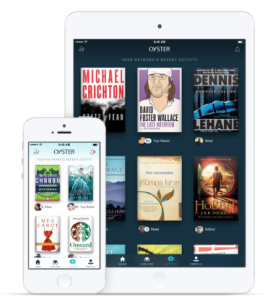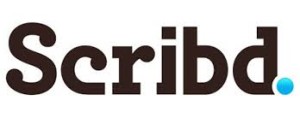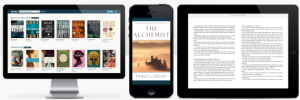Netflix-esque Subscriptions for Books: Oyster, Scribd and Entitle
If you’re a voracious reader, you know that book-love can become an organizational challenge, sometimes even an obstacle. Some readers devour books so quickly and read so many books that either their spaces are overburdened or their bank balances are depleted — or both.
If only there were good solutions for acquiring lots of books, but at minimal cost and without the potential for tangible clutter.
Well, of course there already are. We’ve previously talked about the clutter-reducing aspects of renting individual electronic books for grownups (as well as renting books for kids), borrowing tangible library books (free, but clutter-limiting), and acquiring all manner of ebooks (potentially costly, though borrowing is an option).
Now, two companies have taken a page (no pun intended) out of Netflix’s book, building platforms for renting an unlimited number of ebooks for one flat fee.
Oyster has a basic premise. For $9.95 per month, you get access to an unlimited number of books from Oyster’s collection of 200,000 titles (up from 100,000 at last September’s launch), which you can read on your phone or tablet. The first month is free, and there’s no contract, so trying it out yields no obvious downside. If you buy even one hardcover book per month, or a few Kindle titles, this would seem like a no-brainer. It’s clutter-free and budget-conscious. But is Oyster all it seems to be?
No trip to the store, no waiting for UPS, no per-book cost. If you can acquire a book mere minutes after reading a positive review, without any additional cost, won’t you read more titles and more often? And if you get fifteen pages into it and hate it? It’s far less guilt-inducing to stop reading if you know you haven’t spent an extra penny.
Oyster’s collection of titles ranges from best-sellers to classics, covers fiction and non-fiction, and includes niche genres like science fiction, biographies and self-improvement. In February, Oyster added children’s books, including those from Disney Publishing. (Got a speed-reading tot in the house?)
Of course, breadth of selection is always an issue (just as with Netflix vs. Amazon vs. Hulu). Oyster has partnered with HarperCollins and Houghton Mifflin Harcourt, but most deals are with smaller and niche publishers, including Rodale, Open Road, Melville House, Workman, Algonquin, and self-publishing leader Smashwords.
The Oyster app currently only works on iOS platforms (iPhone, iPad and iPod Touch) but Oyster for Android is allegedly on the way.
Customers can read whether online or offline. Accessible titles are unlimited, but only your last ten titles opened are stored for offline reading. (So, if you want to start a new book while on a flight or Wi-Fi-less train, be sure to read the first sentence or so before heading out!) You can only add or delete titles from your reading list when you’re connected to Wi-Fi.
Currently, Oyster only serves customers in the U.S. or with U.S.-based credit cards. You can read your books “live” when abroad, but your gadget’s roaming charges may apply.
Oyster’s design includes five different font themes. Pages scroll from top to bottom, like web pages, rather than swiping sideways, as on Kindle.
Oyster encourages customers to create profiles linked to their friends, so readers can share what they’re reading via social media. Whether this is a merit or demerit depends on how you feel about your friends knowing you’ve read the Twilight saga.
Scribd launched seven years ago as an online publisher, but released its book subscription service within weeks of Oyster’s debut this past fall. Scribd’s subscription rate is $8.99/month for unlimited digital books and also offers a first month of service for free.
Like Oyster, Scribd offers a wide variety of genres, thought its collections seem to lean more towards genre fiction and older best-sellers. Titles include works published by HarperCollins, E-Reads, Kensington, Red Wheel/Weiser, Rosetta Books, Sourcebooks, Lonely Planet, Workman and Smashwords. Scribd doesn’t say how many titles they have, but as of November 2013, the media was reporting a collection of 50,000 titles with more slightly older offerings.
Scribd’s app works on iPhone, iPad, Kindle Fire and Android gadgets, plus any devices using web browsers, meaning you can start a chapter at your desk and finish it in a taxi. When offline, you can access up to ten stored books. Some Scribd books are available for purchase only and cannot be borrowed. Unlike Oyster, Scribd’s service are available worldwide.
As for design, there are three font options, and pages scroll from left to right, like on a Kindle, or downward, as with the web. Scribd also seems to be accenting the social aspect, just like Oyster — send excerpts of books you’re reading to friends via social media, see friends’ reading lists, and view book reviews.
While almost nobody seems to be talking about it, there’s a third entry in subscription-based books, but with a twist.
Entitle (previously known as eReatah) launched a similar service in December that seems more like the Columbia Record and Tape Club with a dash of DVD-era Netflix. Instead of unlimited offerings, subscribers can choose among three plans (2 books/month for $9.99, 3 books/month for $14.99, or 4 books/month for $19.99). Pricier than Oyster and Scribd? Yes, but readers own their downloads forever — even if they cease to be Entitle subscribers.
Entitle has partnered with two of the Big Five publishers (Simon & Schuster and HarperCollins) as well as Houghton Mifflin Harcourt, Ingram Content Group, Workman, M-Y Books, Kensington and more. Titles are accessible on iOS and Android platforms, as well as Kindle Fire, Nook and Kobo, and on computers via Adobe Digital Editions. Entitle’s 125,000+ titles are primarily fiction, including new releases, with some biographies and memoirs.
Entitle offers an alternative to social curation. To help subscribers make book decisions, Entitle offers curated collections, recommendations, and an “If These Books Had a Baby” taste-predictor service. You can also search the Entitle ebook catalog by release date.
Oyster, Scribd and Entitle all offer gift subscriptions.
Unlimited or otherwise, the Netflix-for-books subscription platform has its critics. Techcrunch suspects that Oyster is at a disadvantage because Scribd already has an 80-million-strong user base of self-publishers of documents from its last seven years in business, which would be competitive with Amazon now that the latter has purchased Goodreads and its available social data about reading habits.
Curmudgeonly Cameron Fuller of the International Business Times seems to think the whole concept will fail — he’s dubious that Americans read enough to sustain use of something that offers immediate access to an unlimited number of books. Maybe. But people are aspirational; Paper Doll believes people want to be readers. Perhaps if they can easily access two pages here, while in line, and a chapter there, over lunch, without excess cost or fear of making poor book choices, they will read more.
Unlimited borrowing for under $10? Limited books per month which you own forever? First-day releases or a massive selection of options? What kind of subscription service would work best to organize your reading? Please share your thoughts, below.









I’ve tried all three, and Scribd is the one I prefer. I don’t like Oyster’s themes. I like the color of one theme and the font of another, and it frustrates me that I can’t mix and match. Also, I read mostly on an Android device, so lack of Android is a deal killer for me. I did sign up for the Android notification, though.
Scribd does have Open Road content also. On their About Us page (http://www.scribd.com/about) they say they have about 300K titles, which technically puts them ahead of Scribd, but I do take all such claims with several grains of salt. I do know that my To Read list in Scribd is long enough to last me for months, and I keep adding to it.
I don’t like Entitle at all. Supposedly you “purchase” the books, but I don’t like purchasing books that can only be read through an app. While technically, you can transfer them to an ereader, the process is cumbersome, if it works, and I couldn’t get it to work, even with the aid of customer service. I accept the limitation with Scribd because I know I’m only “renting” the book and there’s no presumption of anything else. Oh, and your Entitle pricing is wrong in your article. It’s currently $9.99 a month, which bring it on par with Oyster and Scribd.
I write about this sort of thing for TeleRead, which is why I’ve tried all the services and have stayed current with the pricing/offerings. There’s no doubt Scribd has reduced how much I spend on books. I’ve read 25 or so books in Scribd this year, which is a pretty decent cost per book for a voracious reader like me.
Thanks, Juli. It appears that Entitle has recently updated their pricing structure again since I began researching this post. While that brings it in line with the pricing structure for the others, it’s debatable whether unlimited availability is on par with limited, but “owned” titles, in terms of value to the individual reader. From an organizer’s perspective, the value of all three is certainly limited to whether the subscriber will actually read enough titles to make the amortized cost worth it.
Thanks for weighing in!
I didn’t know about any of these! I recently borrowed an e-book from the public library for the first time, but wasn’t able to read it within the two weeks or whatever time I was allowed to keep it. I would probably have more success with fiction, but it was non-fiction and I don’t read it as voraciously.
However, I don’t have an iPad, and reading on the iPhone is too challenging for these old eyes to be enjoyable, so that eliminates Oyster, but I will consider the others.
Great, this was an interesting item, thanks for putting it up, I’m probably going to follow up on what other readers are sharing!
I recently started up a subscription with Scribd and absolutely love it! My favorite feature is the audio book selection since I can turn it on basically anywhere to hear my book instead of only being able to read when I can sit down and stare at a screen/page for any amount of time. Also, I can’t stand buying a book only to realize it’s not for me. This eliminates the issue. I do however wish more books had an audio feature such as Philippa Gregory’s series but I assume that will come with time. For now, I’ll have to read her books at night on screen which I’m totally okay with.
I like the overall experience of Oyster the most, but it s iOS only at the moment. The genre categories and overall presentation feel a lot like Netflix, and the experience was pretty fluid compared to Scribd, which was a little clunky at times. Entitle is more of a bare-bones experience comparatively, but the fact you can keep the books is more appealing to people who like to reread a lot.